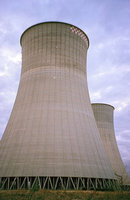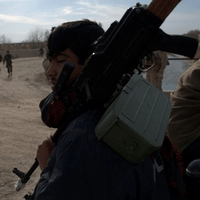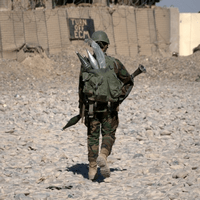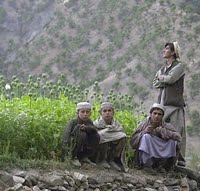I’ve held off on any Marja “analysis,” because a lot of what I’ve read has struck me as “play-by-play” commentary, and I’m pretty convinced that whatever impact offshore observers can have on the debate is better directed toward strategic objectives than tactical operations. What does strike me as significant about the offensive, though, is what it reveals in terms of the evolution of U.S. COIN operations. It’s been clear for a while that in the “clear, hold and build” model, the U.S. military has no real problem with the “clear” phase, provided it is adequately resourced. The decisive phases in […]
Asia-Pacific Archive
Free Newsletter

A large-scale deployment of clean energy technology is gaining speed on the global stage, causing shifts of significant geopolitical consequence. As clean energy moves from margin to mainstream, it is set to alter the balance of energy security and energy power among key regions of the world. Nations will redraw the energy map, both by assessing access to renewable resources and evaluating their traditional alliances. The degree to which frameworks are established so that clean energy drives not just competition, but also cooperation, will be key to determining the impact it ultimately has on international relations. Energy transitions take time. […]

Biofuels were hailed in the first half of the last decade as a green solution to reliance on imported petroleum, and a savior to farmers seeking higher prices for commodities in surplus. But in the second half of the decade, biofuels emerged as real and imminent threats to both environmental quality and food security, while being a costly and ill-conceived response to energy concerns. Agriculture and energy ministers met at a high-level conference at the Food and Agriculture Organization (FAO) in Rome in June 2008, and essentially glossed over these issues in endorsing continued government subsidies to the biofuels question. […]

The UAE raised quite a few eyebrows last December when it announced a $40 billion contract for setting up four nuclear power stations in its territory. But what surprised analysts even more than the size of the contract was who won it: a South Korean consortium led by Korea Electric Power Company (KEPCO), with Toshiba Westinghouse as a minor partner. KEPCO managed to beat out heavyweight rivals, including a consortium led by French major Areva and the U.S.-Japanese alliance of GE-Hitachi, to walk away with the deal. Pundits have talked quite a bit of late about the shift from West […]
Secretary of State Hilary Rodham Clinton speaks at the U.S.-Islamic World Forum in Doha, Qatar. With respect to finding a peaceful, two-state, solution to the Israel-Palestine conflict, Clinton says: “We support a two-state solution, with Israelis and Palestinians co-existing peacefully and with mutual security. We believe that through good-faith negotiations, the parties can mutually agree on an outcome which ends the conflict and reconciles the Palestinian goal of an independent and viable state based on the 1967 lines, with agreed swaps, and the Israeli goal of a Jewish state with secure and recognized borders that reflect subsequent developments and meet […]

Throughout its first year in office, the Obama administration has completed numerous course corrections across the breadth of American foreign policy. Demonstrating the power of a much-needed apology, President Barack Obama’s new-look foreign policy was charming enough to earn him a Nobel Peace Prize. But it struck many observers as a change in style, not substance: Many of Obama’s “changes” merely extended or expanded upon those made during the last two years of the Bush administration, following the repudiation of the 2006 mid-term Congressional elections. Fair enough. But expecting anything more amid the worst global financial crisis in decades was […]

Balint Szlanko has been embedded with the 2nd battalion, 2nd Marine regiment and the 3rd battalion, 4th Marine regiment in Garmsir and Now Zad districts, Helmand province, Afghanistan, in January. His WPR briefings can be found here and here. Following a surge of American troops last year, both areas have recently been cleared of Taliban insurgents. With the onset of winter, fighting has for the moment given way to patrolling and busily interacting with the locals. Cpt. Jason Brezler of Lima company, 3rd battalion, 4th Marine regiment, and an Afghan elder share a moment in the sun in the town […]
With both Indian and Pakistani media sources reporting — and largely supporting — renewed hope for the re-engagement of formal talks between the two nations, panelists at a recent Asia Society talk, “India and Pakistan: Back from the Brink?” agreed that a unique window of opportunity to rev up the historically stalled negotiations now exists — and must be seized. Dr. Adil Najam told event attendees that the time is now ripe, but that relations could soon sour if not taken advantage of. Najam, a professor in international relations at Boston University, said the key to successful, substantive talks will […]

Whenever I ponder some of the challenges U.S. foreign policy faces today in Afghanistan, Somalia, or Yemen, I inevitably return to a passage in Bob Woodward’s “Veil,” describing how Mohammad Hussein Fadlallah, after an attempt to assassinate him had failed, was persuaded to restrain his followers in Lebanon from launching attacks on U.S. interests: The Saudis approached him and asked whether . . . he would act as their early-warning system for terrorist attacks on Saudi and American facilities. They would pay $2 million cash. Fadlallah accepted, but said he wanted the payment in food, medicine and education expenses for […]
When Iran announced this week that it would start enriching its uranium stockpiles to 20 percent — a level much closer to that needed for nuclear weapons production — it closed the first chapter in the history of the Obama administration’s foreign policy. That chapter has ended in failure. Now the administration’s push to get started on Chapter Two is already visible, presumably adopting a more muscular American posture to confront international challenges in Iran and beyond. In his first year, President Barack Obama tried a radically different approach from the confrontational policies practiced by his predecessor, George W. Bush. […]

HELMAND PROVINCE, Afghanistan — For Gen. Nick Carter, commander of NATO forces in southern Afghanistan, and Gen. Larry Nicholson, commander of the U.S. Marines in Helmand, taking a walk late last month in the Garmsir district center’s bazaar without a flak jacket was no big deal. The northern bit of the district, known as the Snake’s Head, has been relatively stable for about a year — unusual for the troubled province of Helmand, which is home to a massive insurgency that makes it a dangerous place to visit even in heavily armored vehicles. But perhaps the most noteworthy thing about […]
Ashraf Ghani, Chairman and Co-Founder of the Institute for State Effectiveness, explains his view on the pillars of insurgency in Afghanistan at the World Economic Forum in Davos. Ghani says that bad governance, a wealthy, drug-funded base, Al-Qaida, and havens in Pakistan are the driving causes leading insurgencies.
Human rights activists are turning up the heat on British company Vedanta Resources over charges that its operations threaten the existence of India’s Dongria Kondh tribe. Cast as a “David versus Goliath” fight by the tribe and its supporters, the Vedanta story comes at a time when stakeholders continue to look for a firm definition and application of a community engagement concept known as Free, Prior, Informed Consent (FPIC), to benefit indigenous peoples around the world. Survival International has appealed to the makers of the blockbuster movie “Avatar” to help the Dongria Kondh fight off mining plans and the pollution […]
I don’t want to make too much of Pakistan’s offer to facilitate negotiations with the Taliban, because there are still a lot of directions it can take, and many of them are probably bad. But it bears noting that the shift responds to Islamabad’s concerns over securing its influence in a post-American Afghanistan, and was triggered by the July 2011 timeframe that President Barack Obama set for beginning an American drawdown. That suggests two things. First, the regional actors are taking that timeframe a lot more seriously than most American observers, something that was already apparent in the immediate reaction […]

Over the past 30 years, the poisonous effects of Afghanistan’s narcotics industry have steadily transformed Iran’s law enforcement and border security institutions, forcing drastic changes in the way Iran deals with what has become a burgeoning transnational narco-insurgency on its southeastern frontier with Pakistan and Afghanistan. Iran’s police chief, Brig. Gen. Ismail Ahmadi Moqaddam, announced last October that Iranian authorities are now using remote security surveillance and control systems from Tehran to help monitor and interdict the massive flow of narcotics streaming over the border from Afghanistan. But despite the country’s draconian anti-narcotics laws and aggressive interdiction efforts, Iran remains […]
Carnegie Endowment Vice President of Studies Douglas H. Paal provides a concise overview of the year ahead in Sino-American relations. From Google to Taiwan arms sales, Paal highlights the challenges that have already made themselves evident in 2010. He also provides context for political posturing in the months to come, such as the Dalai Lama’s visit to the U.S. and the implications it carries for diplomatic relations.
This NY Times article on the Hatoyama government’s determination to fully expose various “secret” Cold War-era U.S.-Japan security accords seems like a timely complement to the current turbulence in U.S.-EU counterterrorism cooperation. Like the U.S.-Japan agreements, many of the U.S.-EU agreements that followed 9/11 operated either entirely covertly (black site detention centers) or else under the radar (data sharing programs), for the simple reason that they would not have withstood popular scrutiny. That kind of pragmatic trade-off, though, comes with costly deferred maintenance, as demonstrated by the Japan article. When these agreements are fully exposed and recognized, even after they’ve […]
